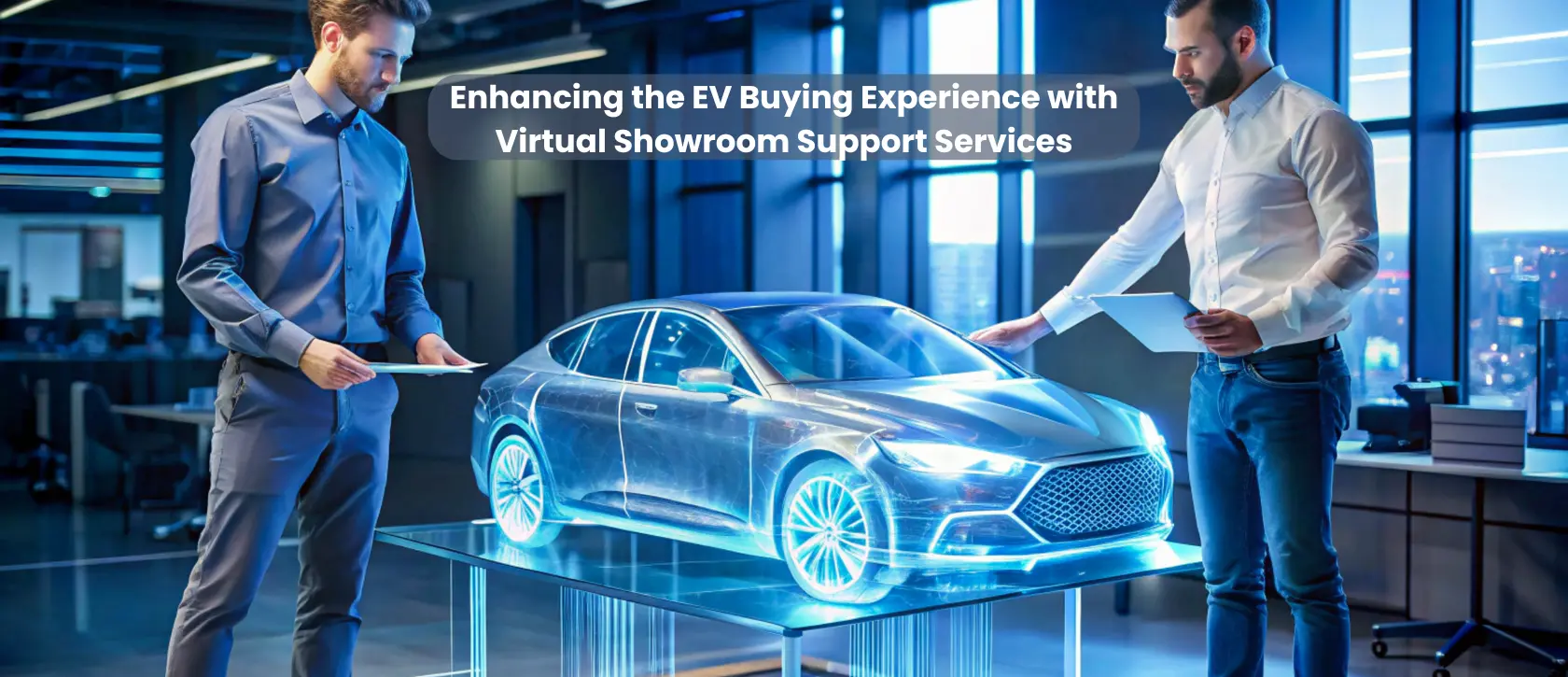
Enhancing the EV Buying Experience with Virtual Showroom Support Services
The electric vehicle (EV) revolution is gaining momentum, and with it, the ways in which we buy our vehicles are transforming. The traditional car/bike dealership experience, with its showroom visits and test drives, is evolving into something much more convenient and immersive—virtual showrooms. These digital spaces offer a new dimension of convenience and engagement, allowing prospective EV buyers to explore the vehicle models in real-time, interact with features, and receive personalized guidance all from the comfort of their own homes. Let’s delve into how virtual showroom support services are reshaping the EV buying experience.
The Rise of Virtual Showrooms in the EV Industry
As EVs gain popularity, manufacturers are stepping up their game with virtual showrooms designed to provide an immersive and dynamic online EV-buying journey. These platforms are emerging as the future of car/bike sales, especially for tech-savvy customers who prefer convenience over visiting a physical dealership.
- Immersive Digital Experience: Imagine walking into a showroom where you can examine every corner of your dream EV—inside and out. Virtual showrooms use advanced 3D imaging, augmented reality (AR), and even virtual reality (VR) to provide a detailed, lifelike experience. Whether it’s rotating the vehicle model 360 degrees, zooming in on specific features, or exploring the interior, the experience mimics a real-life visit without the hassle of travel.
- Personalised Virtual Tours: One of the most exciting aspects of virtual showrooms is the ability to enjoy a customized tour. Virtual assistants or AI-driven chatbots guide users through the process, answering specific questions and showcasing features based on your preferences. Want to know more about the battery performance or how the EV fares in your local climate? You can get instant, tailored insights.
- Interactive Features: Interactive elements make the virtual showroom experience engaging and informative. From clicking on different components to getting detailed specifications, watching feature demos, or even taking a virtual test drive, the experience is both interactive and intuitive. Customers can try out different colors, trims, and configurations in real-time, creating a more informed decision-making process.
- Convenient and Time-Saving: Traditional car/bike shopping requires time scheduling visits, dealing with salespeople, and commuting to multiple dealerships. Virtual showrooms eliminate these time-consuming elements, giving buyers instant access to the latest EV models. Whether you’re on a lunch break or sitting at home in the evening, exploring and purchasing an EV is now a flexible process, offering unmatched convenience.
- Sustainable and Cost-Effective: For both manufacturers and customers, virtual showrooms contribute to sustainability by reducing the need for large physical spaces, inventory, and energy use. They cut down on the resources traditionally required to maintain a dealership and decrease the carbon footprint associated with driving to showrooms. For customers, this often translates into cost savings, as EV manufacturers can focus more on optimizing production rather than showroom upkeep.
The Role of Virtual Showroom Support Services
Virtual showrooms don’t just offer a visually immersive experience they come with a host of support services that streamline the entire EV buying process. From initial inquiry to post-purchase, virtual showroom support enhances customer satisfaction by offering personalized, real-time solutions that cater to modern-day convenience.
- Enhanced Customer Support: In a digital space, customer support takes on a new form. Virtual assistants, chatbots, or even live agents are available at every stage of the buying journey. These systems are designed to handle queries instantly, provide detailed product information, and offer recommendations based on user preferences. Whether it’s helping you compare models or explaining financing options, enhanced customer support ensures that buyers feel well-guided and confident in their decisions.
- Technical Demonstrations: Understanding an EV’s technical features can be overwhelming, especially for first-time buyers. Virtual showrooms address this with in-depth technical demonstrations that explain everything from charging capabilities to battery longevity. Through video tutorials, AR demonstrations, or interactive graphics, buyers can see exactly how the technology works, eliminating confusion and building trust in the product.
- Test Drive Scheduling: Despite the advancements in virtual exploration, nothing beats the feel of an actual test drive. Virtual showroom support services make it easy for customers to schedule test drives, offering real-time availability and convenient booking options. This seamless integration between digital browsing and physical interaction bridges the gap, ensuring the buying process is comprehensive without being cumbersome.
- After-Sales Support: Virtual showrooms extend their services beyond the purchase. They offer robust after-sales support, which includes scheduling service appointments, answering maintenance questions, and providing digital tutorials on the upkeep of the EV. Whether it’s software updates, warranty services, or troubleshooting issues, customers can rely on virtual support to guide them through ownership challenges with ease.
- Feedback Collection: The feedback loop in a virtual showroom is immediate and effective. Manufacturers can quickly gather customer insights through surveys, chat interactions, or reviews, improving the buying process and the product itself. This instant feedback allows companies to refine their virtual showroom features, creating a user-friendly experience that evolves based on customer needs.
- Training and Education: Virtual showrooms go beyond sales to provide educational resources that empower buyers. Whether you’re new to EVs or transitioning from a traditional vehicle, online training modules, how-to guides, and informational videos ensure that customers are knowledgeable about their EV. This makes the ownership journey smoother, as customers are well-prepared to handle their vehicle’s features and requirements.
- Building Long-Term Relationships: The goal of virtual showroom support services isn’t just to sell a car/bike—it’s to build a lasting relationship with the customer. Personalized follow-ups, regular software updates, and tailored offers help companies maintain ongoing communication with buyers, ensuring they feel valued even after the purchase. This long-term connection fosters brand loyalty and makes the customer feel part of an EV community.





